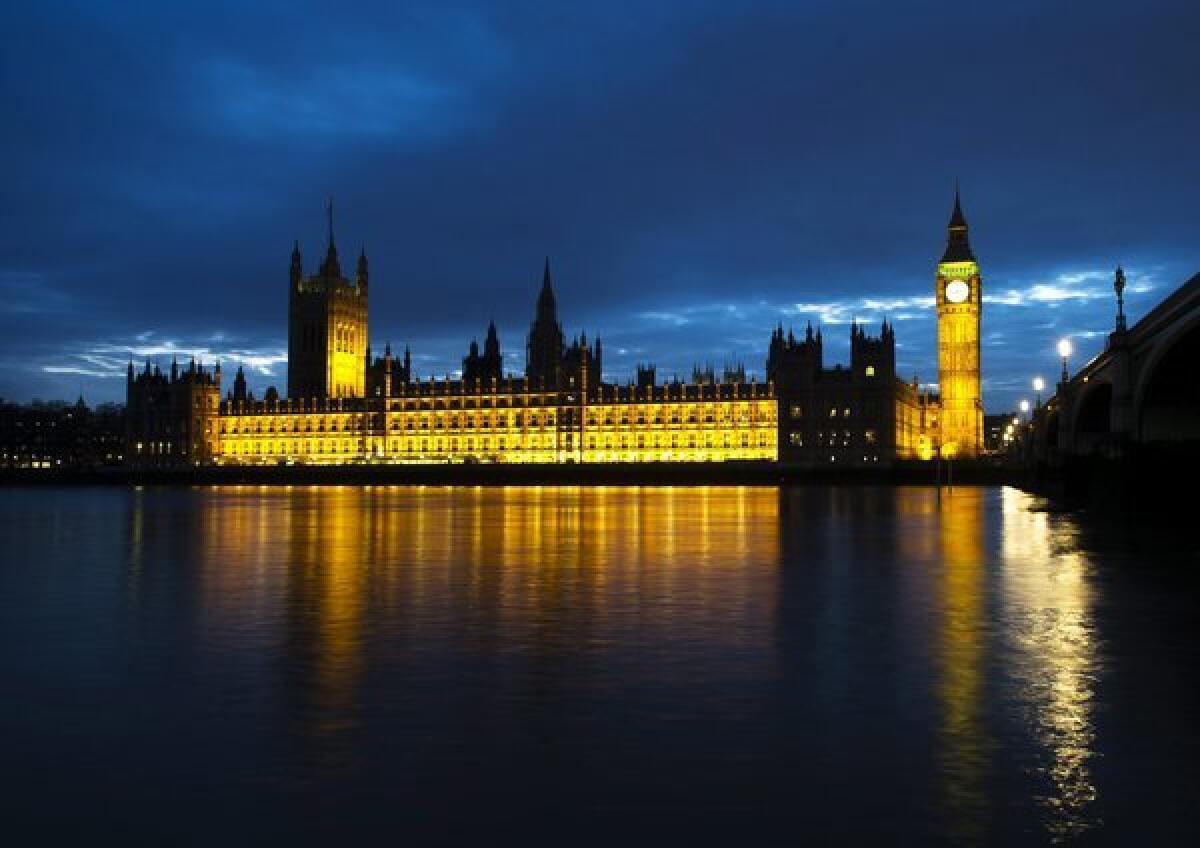Britain rules out second vote on Syrian strike

LONDON --The British government has ruled out a second parliamentary vote on participation in a military strike against the Syrian ruling regime.
Senior politicians had urged another vote after the government’s surprising defeat Thursday, when Parliament rejected plans to respond to lethal nerve gas attacks in Damascus with armed intervention. But the prime minister’s office said Monday there were “absolutely no plans” to go back to Parliament for a second vote.
President Obama’s decision to seek a vote from Congress on military action against the Syrian regime of Bashar Assad sparked demands for the government to reconsider and resubmit a new motion. Western powers hold Assad responsible for chemical attacks that reportedly killed more than 1,400 people on Aug. 21. U.S. Secretary of State John Kerry described evidence Sunday that Assad’s government used deadly sarin gas on civilians.
“If there is new and better evidence that inculpates Assad I see no reason why the Government should not lay a new motion before Parliament, inviting British participation,” London Mayor Boris Johnson wrote in Monday’s Daily Telegraph.
Malcolm Rifkind, chairman of the interparliamentary intelligence committee, told the BBC that the delay caused by Obama’s decision to go to Congress for approval “opens a very important new opportunity” for the British coalition government and the Labour opposition party to reconsider and agree on a new motion.
However, after the daily briefing to the national press on Monday morning, the prime minister’s spokesman (who was unidentified, following British government policy) was quoted in the Guardian saying, “Parliament has spoken. The government has absolutely no plans to go back to parliament. In response to the use of chemical weapons, the government made the case for a robust response. It put before the house the joint intelligence committee paper. The government made its case and parliament expressed its view. Parliament has made clear its will that there be no British involvement in military action and we will respect that.”
Deputy Prime Minister Nick Clegg was similarly adamant. The BBC quoted him telling a news conference: “We’re not going to go back to Parliament with the same question on the same issue, in response to the same atrocity the week before last, because that decision was made by Parliament.
“We’ve made it very clear to our international partners that that is our decision now.”
Defense Secretary Philip Hammond, speaking in Parliament on Monday afternoon, also said the matter was effectively decided.
“We believe that Parliament has spoken clearly on this issue and is unlikely to want to revisit it unless the circumstances change very significantly,” he said.
Meanwhile in Brussels, the NATO secretary general, Anders Fogh Rasmussen, strongly urged a response to the attacks.
“We believe that these unspeakable actions, which claimed the lives of hundreds of men, women and children cannot be ignored,” he told a monthly press conference.
“There is a reason that chemical weapons are banned across the civilized world,” he said, “They are horrific and barbaric arms that have no place in the 21st century. And NATO Allies consider the use of chemical weapons as a threat to international peace and security.”
As a former Danish prime minister, he said he was respectful of democracy and the decisions made by individual alliance partners. Still, he said, “as the situation in Syria demonstrates, we continue to face significant security challenges. And it is vital that we are prepared to meet them.”
He said NATO was cooperating with Turkey, “and we remain determined to protect the alliance’s southeastern border.” The alliance was also working to “address critical shortfalls, such as drones for intelligence, surveillance and reconnaissance, within NATO and in the European Union.”
ALSO:
Nelson Mandela home from hospital, remains ‘unstable’
Mohamed Morsi to stand trial in deaths of Egyptian protesters
Obama’s bid to attack Syria faces resistance from 2 sides in Congress
More to Read
Sign up for Essential California
The most important California stories and recommendations in your inbox every morning.
You may occasionally receive promotional content from the Los Angeles Times.








